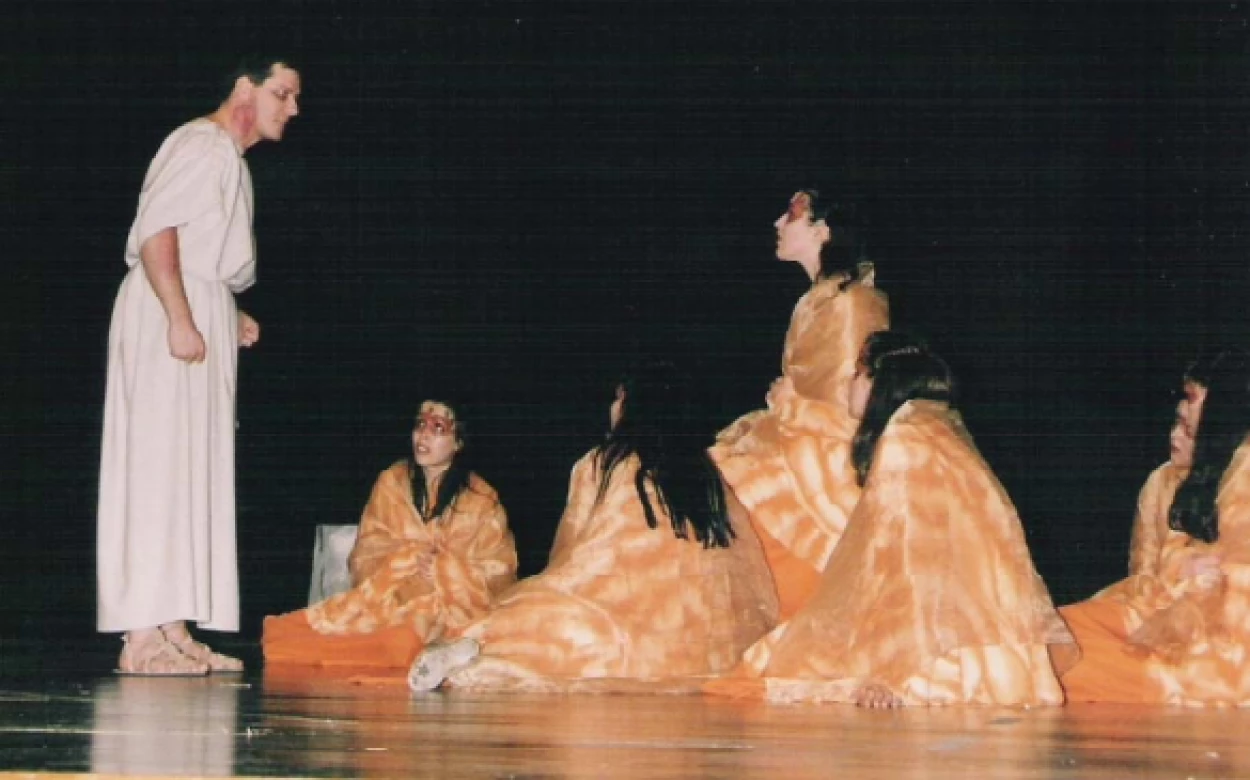Women of Trachis
Debut: 24 April, 2003
Women of Trachis by Sophocles
Staging: Delfim Ferreira Leão
Translation: Maria do Céu G. Z. Fialho
Synopsis
With this production, Thíasos rehearses for the second time the paths of Greek tragedy. As the staging’s guiding line it was adopted the image of fire, as a metaphor of the passion that overwhelms the central characters (Deianeira and Heracles) and also as a symbol of the very destruction that had befallen the hero of the twelve works (first in the mantle offered by Deianeira and lastly in the final pyre). The ambivalence of this powerful sign marks the choir’s very characterization, whose clothing suggests the unstable colours of fire. Moreover, it is the choir’s function to narrate and stress (with less text and more recourse to music and choreography) part of the drama that will be experienced by the couple Deianeira/Heracles. It is the choir who truly begins the play, through a dance that suggests the idea of a loving relationship that is built through the intersection of steps and gestures until the shadow of separation settles in. Only when the choir fades away (as if all its elements were statues of a garden) does Deianeira enter, telling the nanny her soul’s fears. All the movements of the choir aim to provide a sub-text capable of creating in the audience several levels of reading. For this reason, all the positions in stage seek to evoke motifs of Greek sculpture (the Caryatides, the Victory of Samothracia, the frieze of a temple), in a constant metamorphosis that serves sometimes as a comment or reinforcement of the action taking place. The same goal is intended with the stage details (eight quadrangular blocks), which function as bases of statues, judges’ benches or even as the firewood of the pyre that will evoque Heracles’s immolation in the final scene where the robes and the young women of Trachis themselves turn into the fire that consumes the Greek hero until they fall on the ground, like still warm ashes. The strong focus on music and choreographic elements, which appear, and for the first time, as one of Thíasos’ staging strong options, seeks to meet a conception of Greek theatre as an art form that lives much of the word, but also of music, singing and dance.
Delfim Ferreira Leão, in M. Fátima Silva (coord.), Representações de Teatro Clássico no Portugal Contemporâneo III (Coimbra, FLUC, 2004) 52-53.
Production credits
Stage manager: Victor Torres
Choreography: Carla Braz
Wardrobe: Luísa de Nazaré Ferreira, Maria Valente, Inês Santos
Sound and lights: Carlos Santos, Isidro Alves, Carlos de Jesus.
Cast
Elisa Bogalheiro, Patricia Santos (Deianeira)
Maria Amélia Álvaro de Campos, Sofia Costa, Natalia Alves (Nanny)
Nuno Gertrudes (Hyllus)
José Luís Brandão (Messenger)
Bruno Fernandes (Lichas)
Delfim F. Leão, Luís Marques Cruz (Heracles)
Manuel Santos, Joaquim da Silva (Extras)
Chorus: Carla Braz, Carla Simões, Carla Marques, Liliana Dias, Liliana Figueiredo, Lia Nunes, Natália Alves, Patrícia Ferreira, Silvia Costa, Sónia Santos, Susana Bastos, Verónica Fachada.


